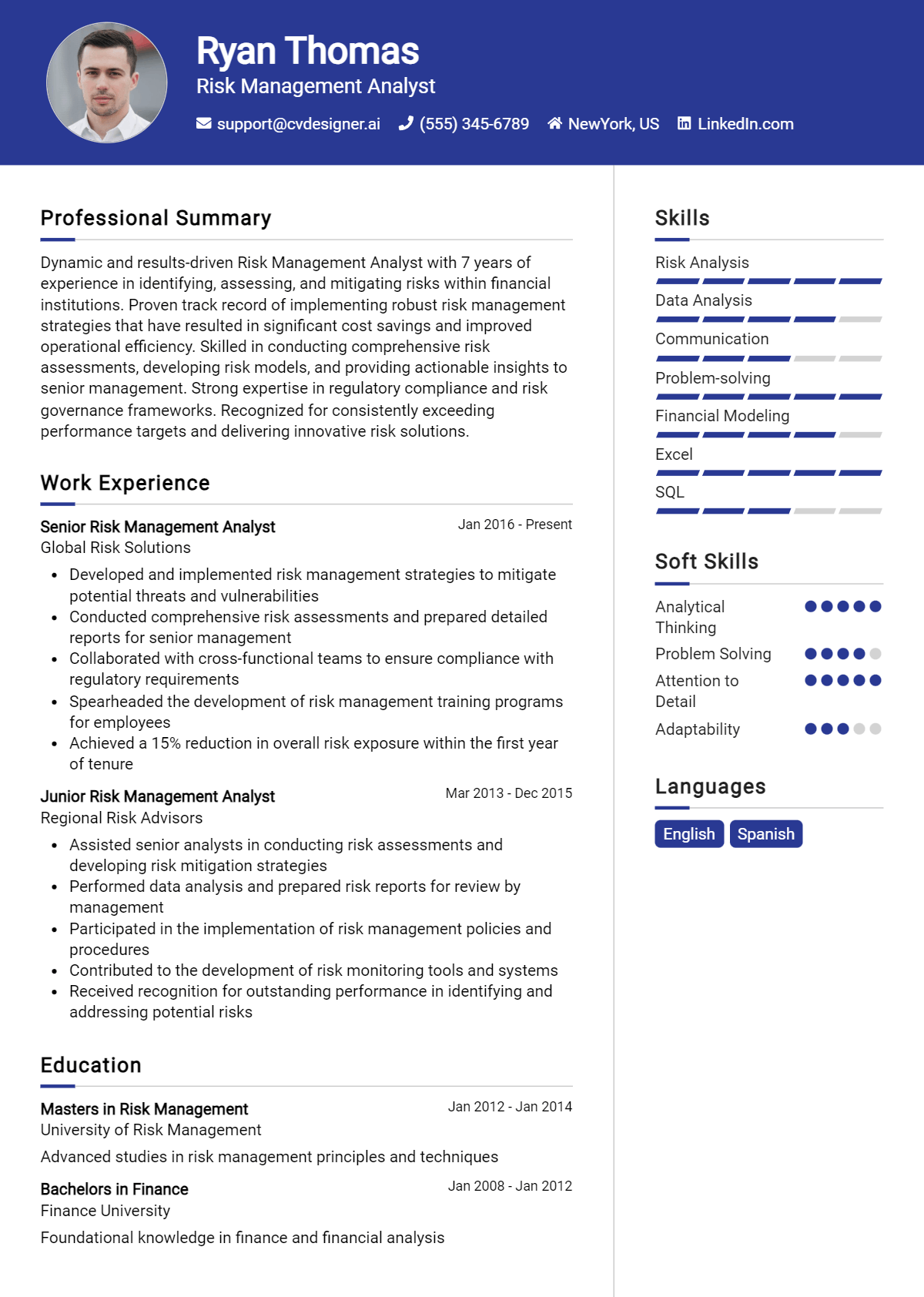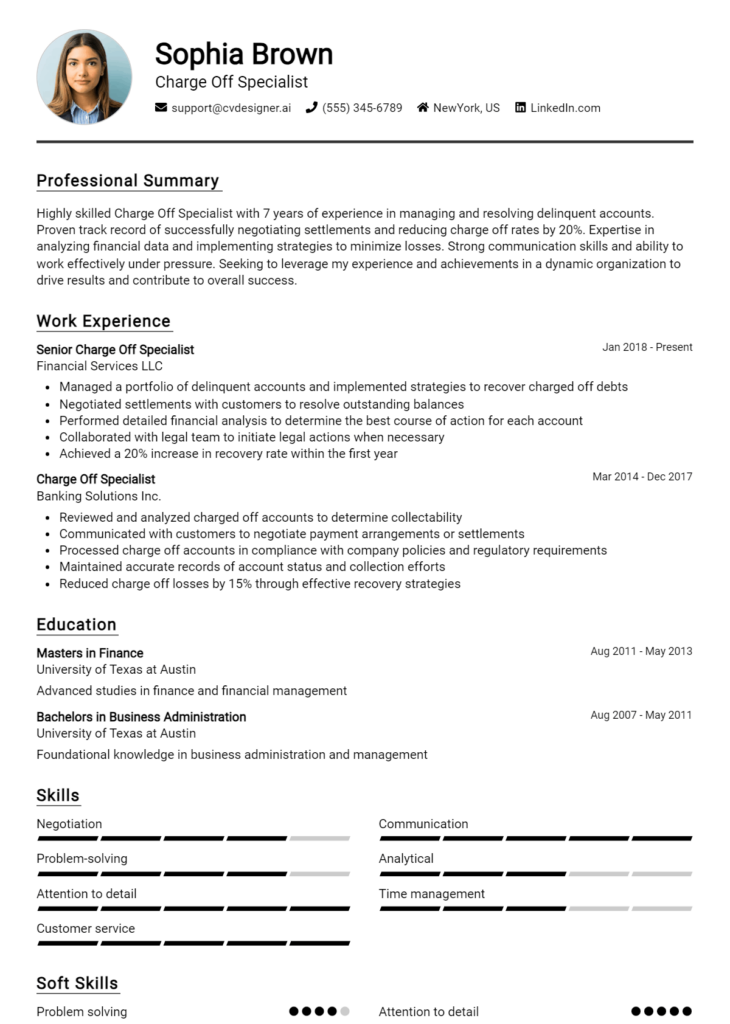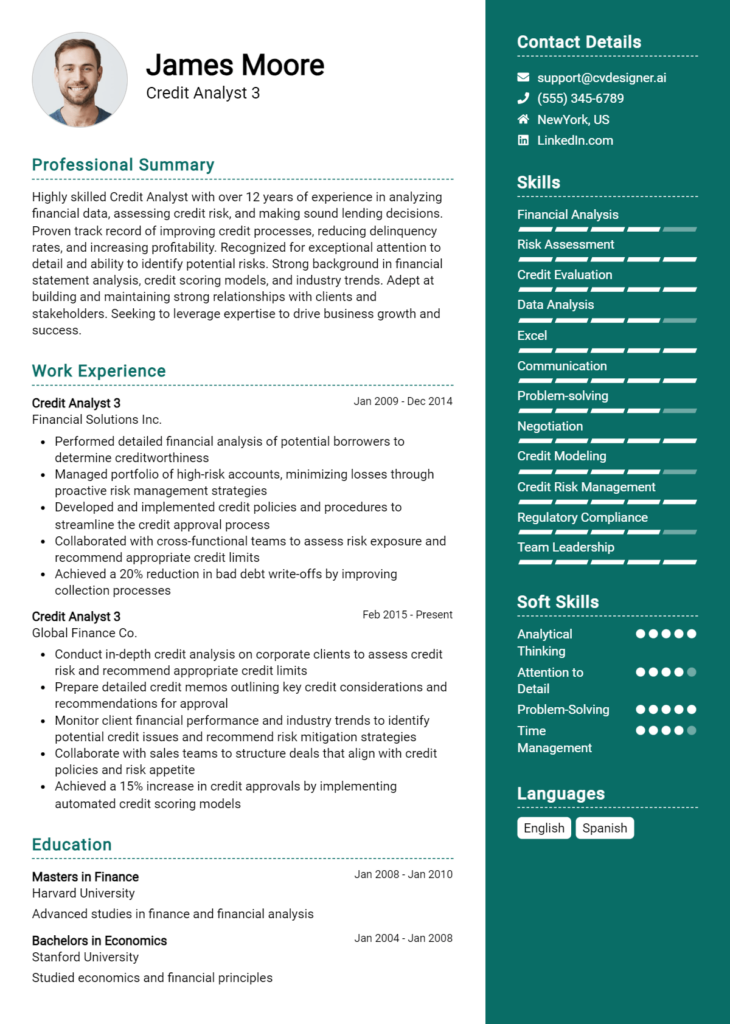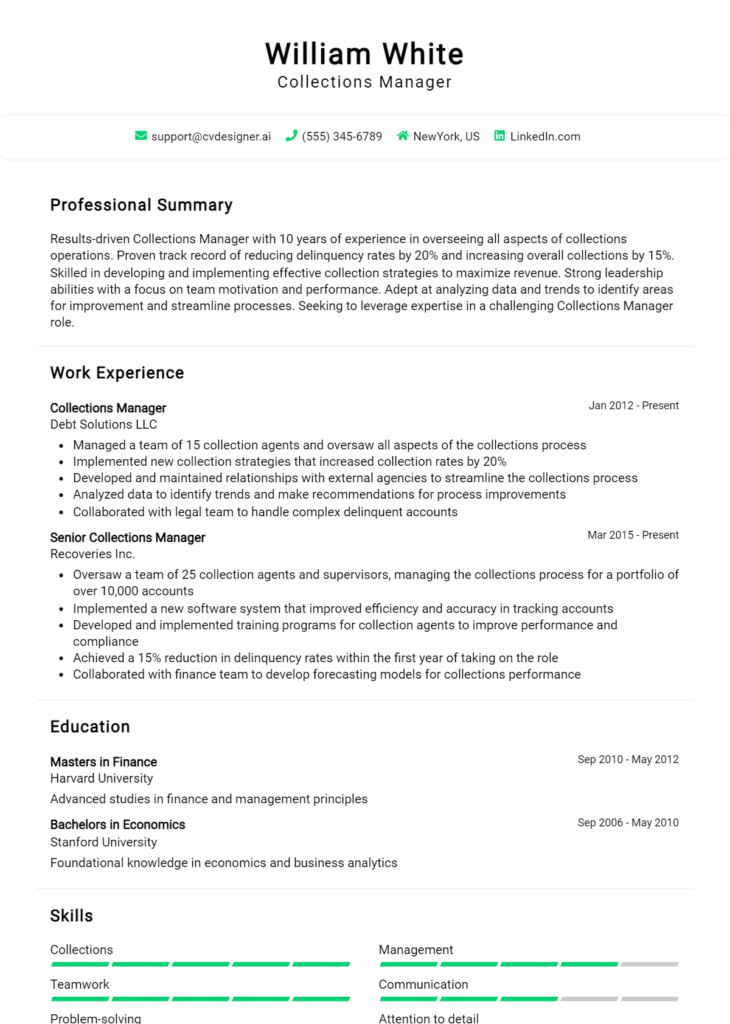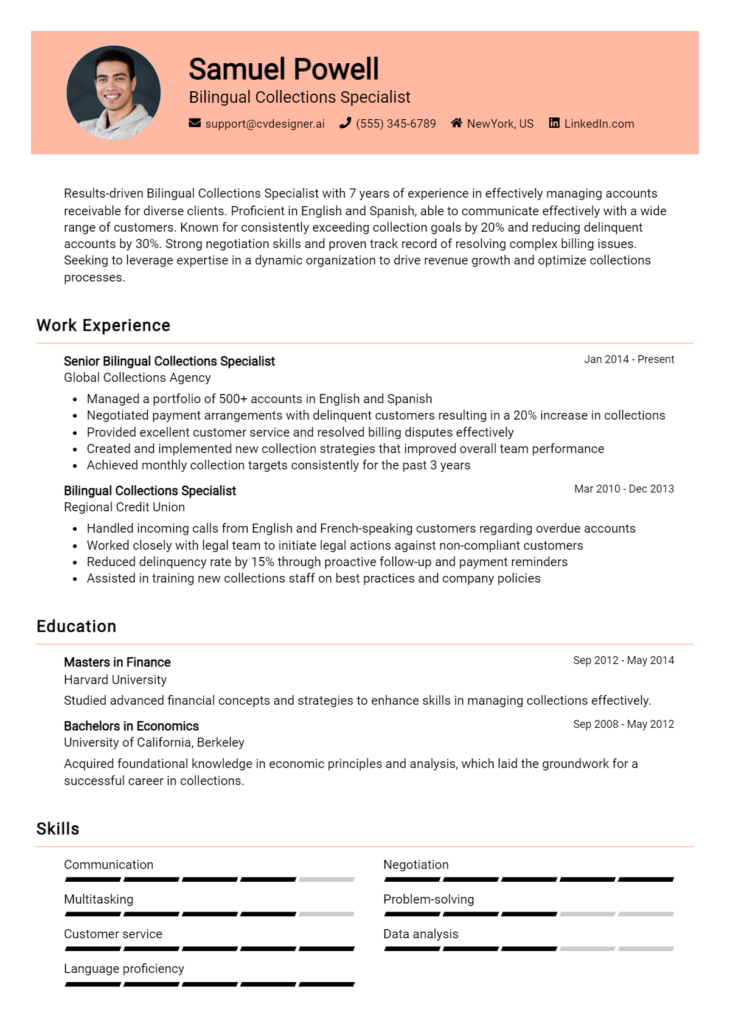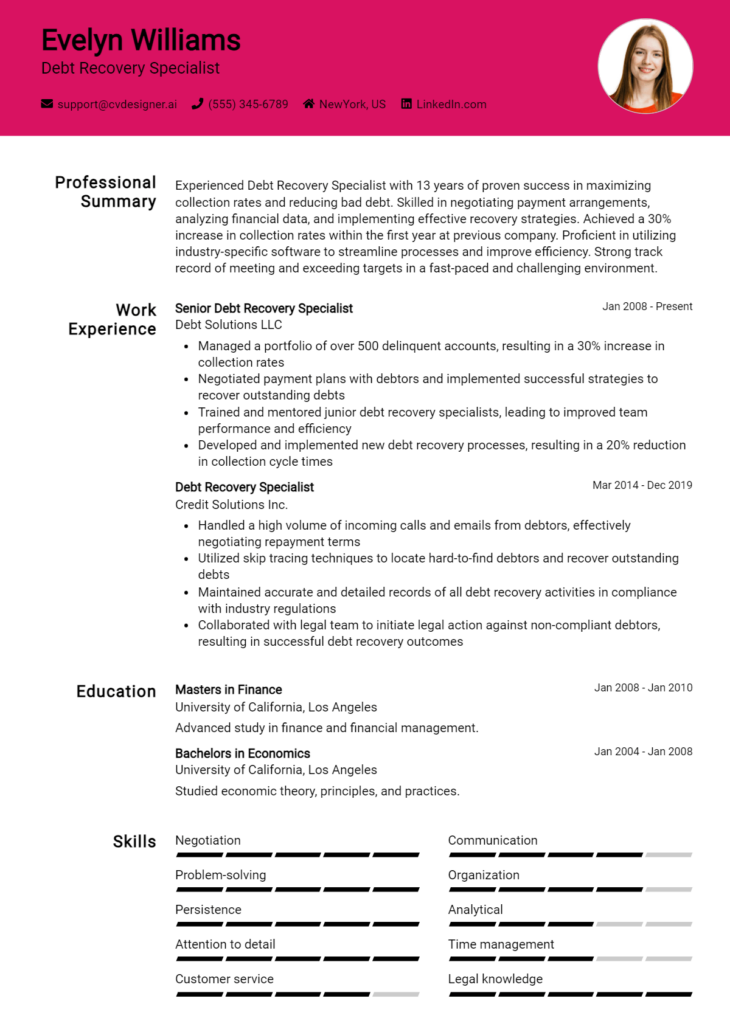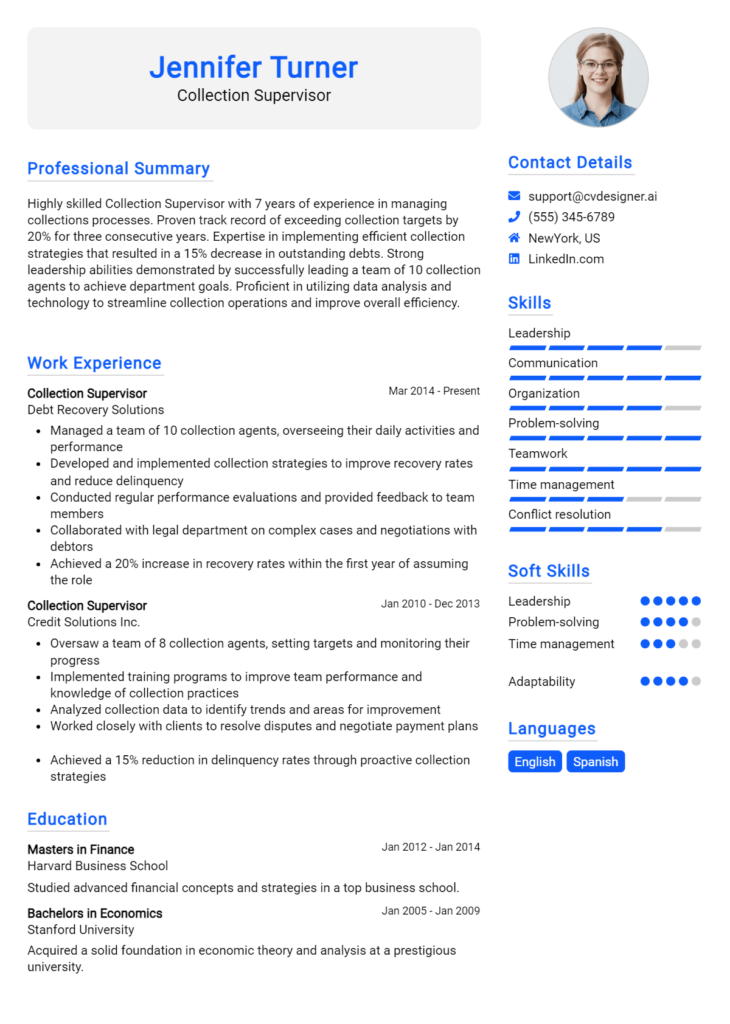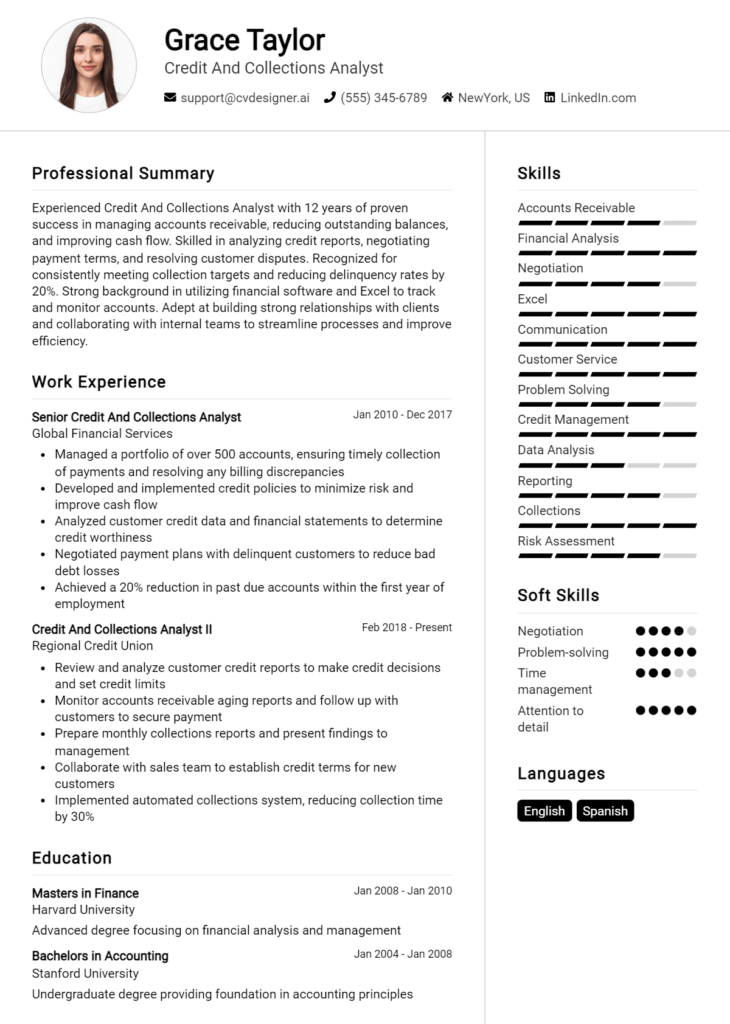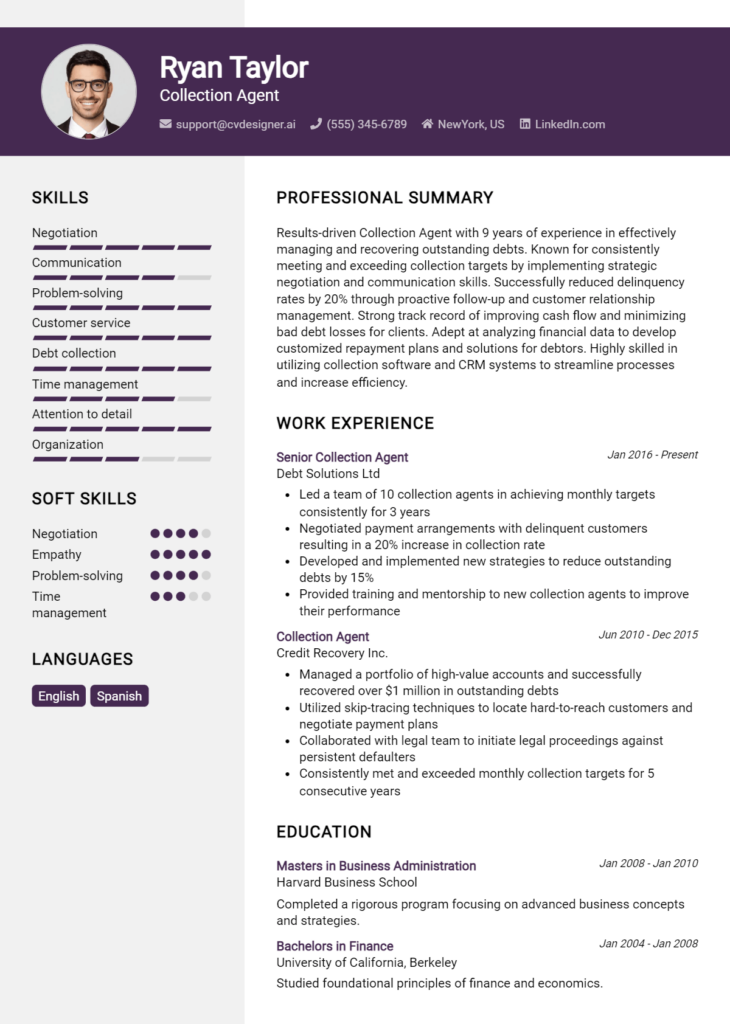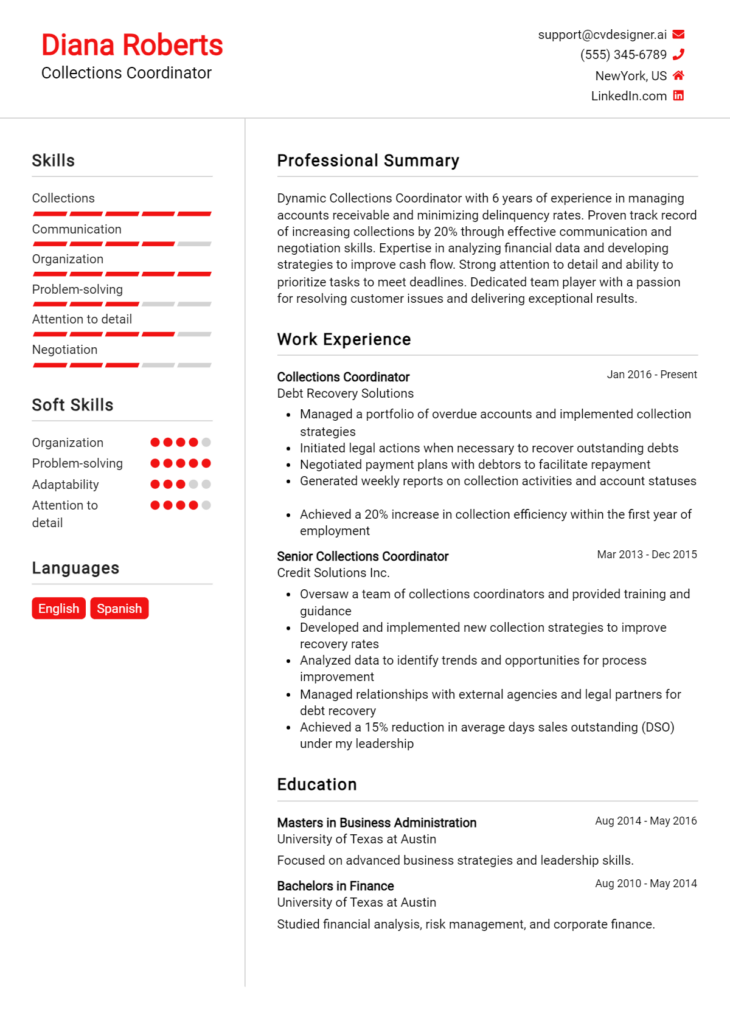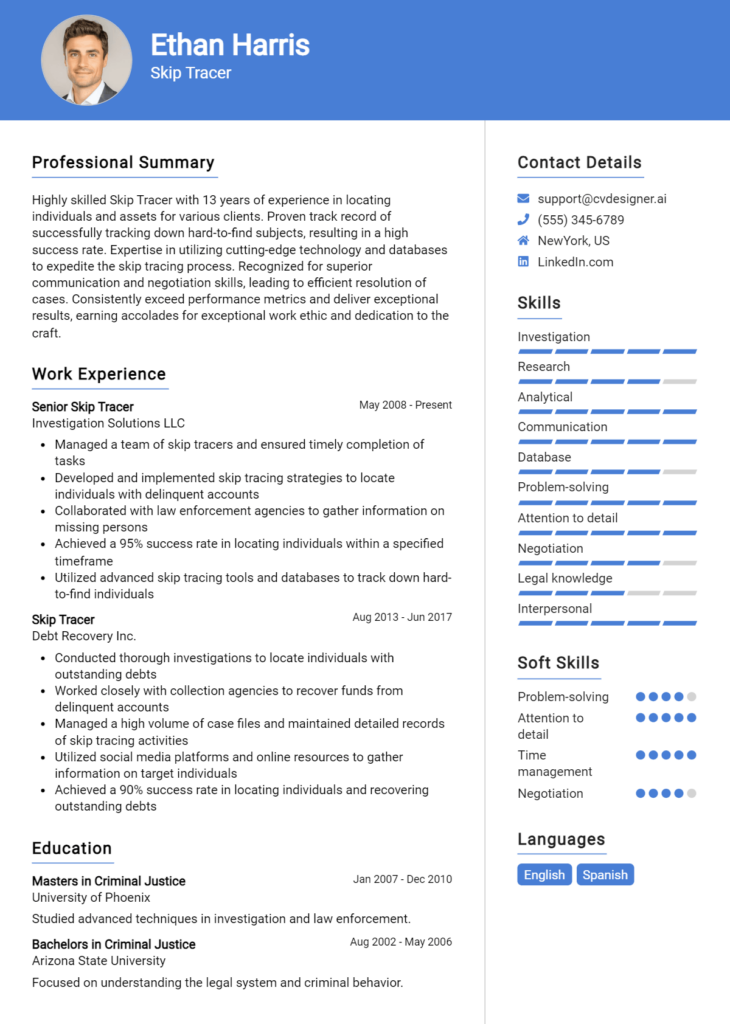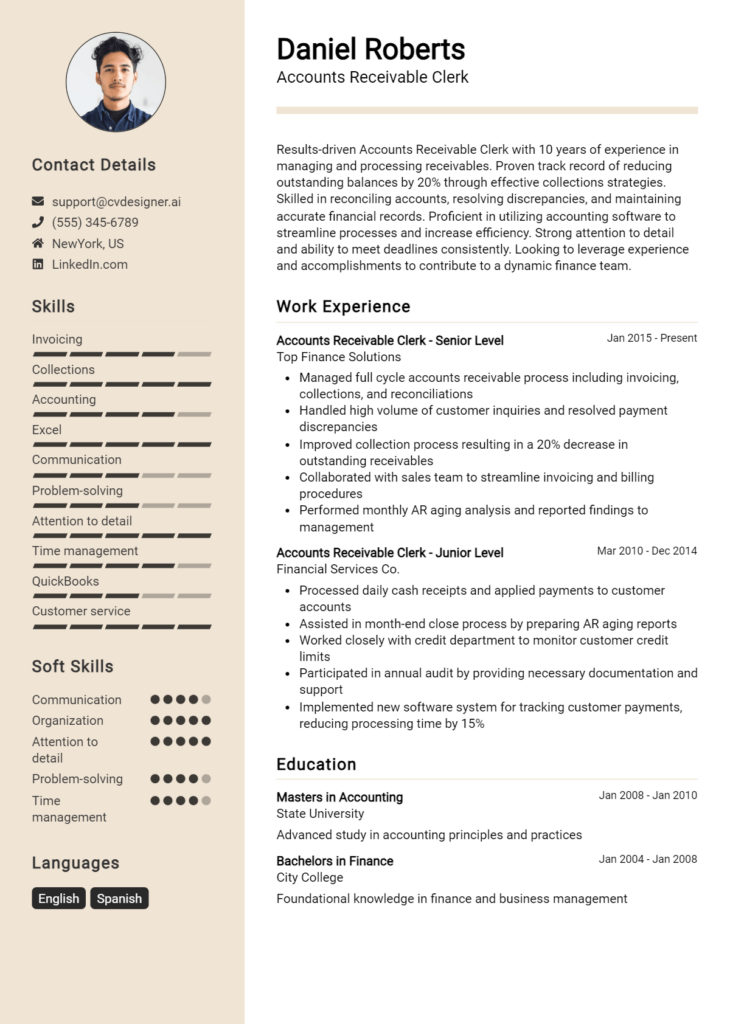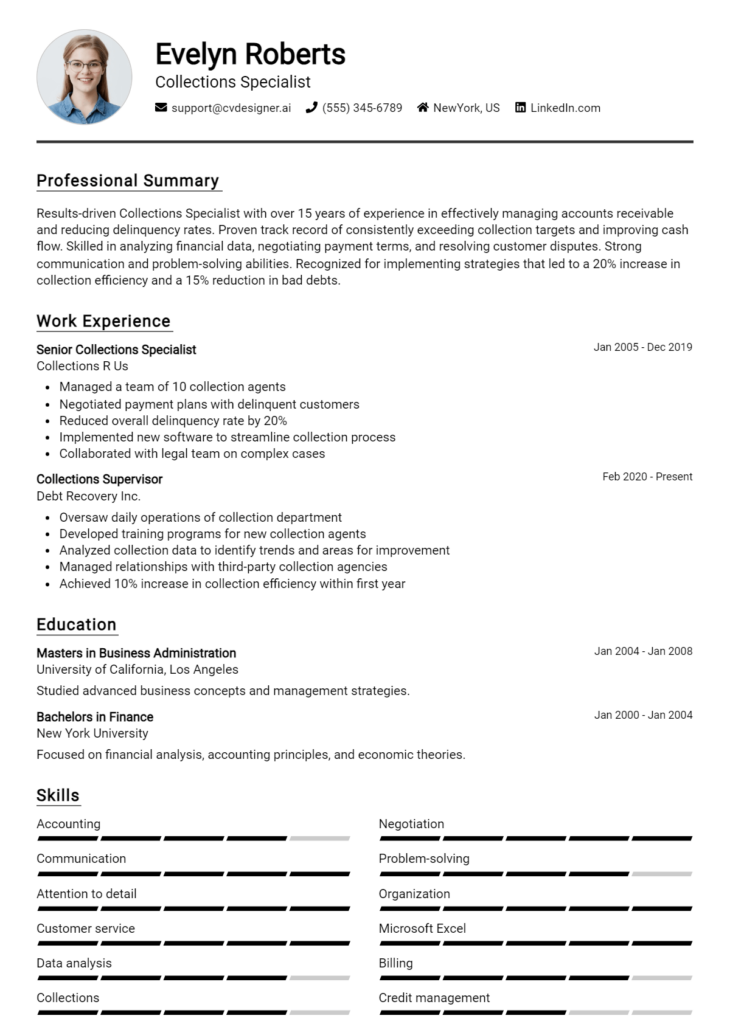Risk Management Analyst Core Responsibilities
A Risk Management Analyst plays a crucial role in identifying, analyzing, and mitigating potential risks that can affect an organization's operations. This position requires strong technical skills, operational knowledge, and exceptional problem-solving abilities to effectively bridge different departments, ensuring a cohesive approach to risk management. By leveraging these skills, analysts contribute significantly to organizational goals, enhancing decision-making processes and safeguarding assets. A well-structured resume can effectively showcase these qualifications, highlighting expertise and experience in risk assessment and management.
Common Responsibilities Listed on Risk Management Analyst Resume
- Conducting risk assessments and identifying potential vulnerabilities.
- Developing risk management strategies and policies.
- Collaborating with various departments to implement risk mitigation plans.
- Analyzing data to identify trends and potential risks.
- Preparing detailed reports and presentations on risk findings.
- Monitoring compliance with regulatory requirements and internal policies.
- Training staff on risk management practices and procedures.
- Evaluating the effectiveness of risk management programs.
- Staying updated on industry trends and best practices in risk management.
- Assisting in the development of contingency plans and crisis management protocols.
- Utilizing risk management software and tools for analysis.
High-Level Resume Tips for Risk Management Analyst Professionals
In the competitive field of risk management, a well-crafted resume is crucial for professionals looking to make a strong first impression on potential employers. Your resume serves as your personal marketing tool, showcasing not only your skills and qualifications but also your achievements and unique value proposition. A compelling resume can set you apart from other candidates in a field where precision and attention to detail are paramount. This guide will provide practical and actionable resume tips specifically tailored for Risk Management Analyst professionals, ensuring that your resume effectively reflects your potential and readiness for the role.
Top Resume Tips for Risk Management Analyst Professionals
- Tailor your resume for each job application by incorporating keywords and phrases from the job description to demonstrate alignment with the role.
- Highlight relevant experience prominently, focusing on roles where you managed risks, conducted analyses, or developed risk mitigation strategies.
- Quantify your achievements with specific metrics, such as the percentage of risk reduction you achieved or the dollar amount saved through your initiatives.
- Include industry-specific skills, such as proficiency in risk assessment tools, data analysis software, and knowledge of regulatory requirements.
- Utilize a clear, professional format that makes your resume easy to read and visually appealing, ensuring that key information stands out.
- Incorporate a summary statement at the top that succinctly captures your career highlights and professional focus within risk management.
- Use action verbs to describe your responsibilities and accomplishments, making your contributions come alive to the reader.
- List relevant certifications and ongoing professional development to demonstrate your commitment to staying current in the field.
- Proofread meticulously to eliminate any typos or grammatical errors, as attention to detail is crucial in risk management roles.
By implementing these tips, you can significantly enhance your chances of landing a job in the Risk Management Analyst field. A polished and targeted resume will not only showcase your qualifications but also convey your understanding of the industry's demands, ultimately making you a more attractive candidate to potential employers.
Why Resume Headlines & Titles are Important for Risk Management Analyst
In the highly specialized field of risk management, a Risk Management Analyst plays a crucial role in identifying, assessing, and mitigating potential risks that could impact an organization’s operations and financial stability. When applying for such a pivotal position, the importance of a resume headline or title cannot be overstated. A strong headline or title serves as the first impression for hiring managers, encapsulating a candidate's key qualifications and strengths in a single impactful phrase. It should be concise, relevant, and directly aligned with the job being applied for, ensuring that the candidate stands out in a competitive job market.
Best Practices for Crafting Resume Headlines for Risk Management Analyst
- Keep it concise: Aim for a headline that is no longer than one or two lines.
- Be role-specific: Tailor the headline to reflect the specific position of Risk Management Analyst.
- Highlight key skills: Include essential skills such as risk assessment, data analysis, and compliance.
- Use impactful language: Choose strong, action-oriented words that convey your expertise.
- Include relevant qualifications: Mention certifications or degrees that are pertinent to the role.
- Avoid jargon: Use clear language that can be understood by hiring managers and recruiters.
- Reflect your experience level: Indicate whether you are an entry-level analyst or a seasoned professional.
- Align with job descriptions: Use keywords from the job posting to create a relevant headline.
Example Resume Headlines for Risk Management Analyst
Strong Resume Headlines
"Results-Driven Risk Management Analyst with 5+ Years in Financial Risk Assessment"
“Certified Risk Management Professional Specializing in Data-Driven Insights and Compliance Solutions”
“Proactive Risk Analyst with Expertise in Operational Risk Mitigation and Strategic Planning”
“Detail-Oriented Risk Management Analyst with Proven Track Record in Regulatory Compliance and Risk Mitigation”
Weak Resume Headlines
“Risk Management Analyst Seeking Job”
“Experienced Professional in Risk Management”
The strong headlines are effective because they clearly communicate the candidate's unique qualifications and areas of expertise, immediately catching the eye of hiring managers. They showcase relevant experience, specific skills, and accomplishments in a concise manner. In contrast, the weak headlines fail to impress because they are vague and non-specific, lacking the detail necessary to grab attention or convey the candidate's value proposition. Without a compelling headline, candidates risk blending into a sea of applicants without making a memorable impact.
Writing an Exceptional Risk Management Analyst Resume Summary
A well-crafted resume summary is crucial for a Risk Management Analyst as it serves as the first impression a hiring manager will have of a candidate. This brief yet impactful section quickly captures attention by highlighting key skills, relevant experience, and notable accomplishments that align with the job role. An effective summary is concise and tailored to the specific position, ensuring that it resonates with the employer's needs and expectations, ultimately increasing the chances of securing an interview.
Best Practices for Writing a Risk Management Analyst Resume Summary
- Quantify Achievements: Use numbers and metrics to demonstrate the impact of your contributions, such as reduced risk percentages or cost savings.
- Focus on Relevant Skills: Highlight specific skills that are in demand for the position, such as risk assessment, data analysis, or compliance knowledge.
- Tailor for the Job Description: Customize your summary to reflect the requirements and keywords from the job listing.
- Keep it Concise: Aim for 2-4 sentences that deliver your message clearly and effectively.
- Showcase Industry Knowledge: Mention familiarity with industry standards, regulations, and frameworks relevant to risk management.
- Highlight Key Accomplishments: Emphasize any awards, recognitions, or successful projects that showcase your expertise.
- Use Action Verbs: Start sentences with dynamic action verbs to convey a sense of proactivity and effectiveness.
- Maintain Professional Tone: Use clear and professional language that reflects your business acumen.
Example Risk Management Analyst Resume Summaries
Strong Resume Summaries
Results-driven Risk Management Analyst with over 5 years of experience in identifying and mitigating risks in financial services. Successfully reduced operational losses by 30% through the implementation of robust risk assessment frameworks and continuous monitoring processes.
Detail-oriented analyst with proven expertise in regulatory compliance and risk analysis. Spearheaded a project that improved compliance score from 75% to 95%, ensuring alignment with industry standards and enhancing company reputation.
Dynamic Risk Management Analyst skilled in data analysis and risk modeling. Developed a predictive risk assessment tool that increased risk identification accuracy by 40%, contributing to informed decision-making and strategic planning.
Weak Resume Summaries
Experienced analyst with some knowledge of risk management. I have worked in various roles and can handle multiple tasks.
Dedicated professional looking for a position in risk management. I have a background in finance and am willing to learn more about the industry.
The examples of strong resume summaries are considered effective because they provide specific, quantifiable results and directly relate to the skills and experiences relevant to the Risk Management Analyst role. They demonstrate a clear understanding of risk management principles and showcase accomplishments that would be attractive to potential employers. In contrast, the weak summaries lack specificity and measurable outcomes, making them vague and less engaging. They do not convey the candidate's value or relevance to the position, which can hinder their chances of progressing in the hiring process.
Work Experience Section for Risk Management Analyst Resume
The work experience section of a Risk Management Analyst resume is vital as it serves as a comprehensive showcase of the candidate's technical skills, leadership capabilities, and ability to deliver high-quality results. This section not only highlights the candidate's past roles and responsibilities but also emphasizes their contributions to risk management initiatives, demonstrating how they effectively navigate challenges and enhance organizational resilience. By quantifying achievements and aligning experience with industry standards, candidates can present a compelling narrative that illustrates their value to potential employers.
Best Practices for Risk Management Analyst Work Experience
- Clearly outline your roles and responsibilities in each position, focusing on specific risk management practices.
- Quantify your achievements, such as percentage reductions in risk exposure or improvements in compliance metrics.
- Highlight technical expertise in relevant tools and methodologies, such as risk assessment software and statistical analysis techniques.
- Showcase leadership and collaboration by detailing experiences in managing teams or cross-departmental projects.
- Use action verbs to convey your contributions and impact effectively.
- Align your experience with industry standards and best practices to demonstrate your knowledge of the field.
- Include relevant certifications or training that reinforce your qualifications in risk management.
- Tailor your work experience to match the specific requirements of the job you are applying for.
Example Work Experiences for Risk Management Analyst
Strong Experiences
- Led a cross-functional team to implement a new risk assessment framework, resulting in a 30% reduction in identified risk factors within one year.
- Utilized advanced data analytics tools to identify and mitigate potential risks, leading to a 25% decrease in compliance violations over two years.
- Developed and presented risk management reports to senior leadership, facilitating strategic decisions that improved project outcomes by 40%.
- Collaborated with IT and finance teams to create a comprehensive risk management policy, enhancing organizational risk awareness and response times by 50%.
Weak Experiences
- Assisted in risk assessment tasks without specifying the tools or methods used.
- Participated in team meetings to discuss risks without detailing contributions or outcomes.
- Worked on projects related to risk management but did not provide quantifiable results or specific impacts.
- Helped with compliance checks but failed to mention any improvements or changes made during the process.
The examples provided illustrate a clear distinction between strong and weak experiences. Strong experiences are characterized by quantifiable outcomes and specific contributions that reflect the candidate's technical leadership and collaborative efforts. In contrast, weak experiences lack detail, measurable results, and fail to highlight the candidate's role or impact, making them less compelling to potential employers.
Education and Certifications Section for Risk Management Analyst Resume
The education and certifications section of a Risk Management Analyst resume plays a crucial role in establishing the candidate's qualifications and expertise within the field. This section not only highlights the candidate's academic background but also showcases their commitment to professional development through industry-relevant certifications and continuous learning efforts. By providing pertinent coursework, recognized certifications, and specialized training, candidates can significantly enhance their credibility and demonstrate their alignment with the specific requirements of the job role, making them more appealing to potential employers.
Best Practices for Risk Management Analyst Education and Certifications
- Include only relevant degrees and certifications that directly relate to risk management, finance, or related fields.
- List advanced or industry-recognized credentials, such as Certified Risk Management Professional (CRMP) or Financial Risk Manager (FRM).
- Provide details on relevant coursework, particularly if it involved risk assessment, financial analysis, or compliance.
- Use clear formatting to enhance readability, such as bullet points and consistent font styles.
- Highlight any specialized training programs or workshops that pertain to current industry practices.
- Keep the section concise, focusing on the most impactful educational experiences and certifications.
- Update the section regularly to reflect new certifications or education that enhance your qualifications.
- Consider including honors or distinctions earned during your studies that demonstrate academic excellence.
Example Education and Certifications for Risk Management Analyst
Strong Examples
- M.S. in Risk Management, New York University, 2022
- Certified Risk Management Professional (CRMP), 2023
- B.S. in Finance, University of California, 2020 - Relevant Coursework: Risk Analysis, Financial Derivatives
- Certification in Quantitative Risk Analysis, Risk Management Association, 2021
Weak Examples
- B.A. in History, University of Texas, 2015
- Certification in Basic First Aid, American Red Cross, 2018
- MBA in General Management, University of Michigan, 2019 (not specialized in risk management)
- Online course in Personal Finance, 2021 (not relevant to risk management)
The strong examples are considered effective because they directly relate to the skills and knowledge required for a Risk Management Analyst position, showcasing both relevant degrees and certifications that are recognized in the industry. In contrast, the weak examples highlight qualifications that lack relevance to the role, either due to their unrelated subject matter or because they do not demonstrate a focus on risk management or financial analysis, which are essential for success in this career path.
Top Skills & Keywords for Risk Management Analyst Resume
In the competitive field of risk management, a well-crafted resume is essential for showcasing your qualifications and distinguishing yourself from other candidates. The skills you highlight can significantly influence hiring managers' perceptions of your capabilities and potential contributions to their organization. As a Risk Management Analyst, demonstrating a blend of both hard and soft skills is crucial. Hard skills, such as data analysis and risk assessment, reflect your technical abilities, while soft skills, like communication and problem-solving, showcase your interpersonal strengths. Together, these skills create a compelling narrative about your professional competence and your fit for the role.
Top Hard & Soft Skills for Risk Management Analyst
Hard Skills
- Risk assessment and analysis
- Data analysis and statistical modeling
- Financial forecasting
- Regulatory compliance knowledge
- Project management
- Auditing and internal controls
- Risk mitigation strategies
- Business continuity planning
- Cybersecurity risk management
- Insurance and claims management
- Financial reporting
- Software proficiency (e.g., Excel, SAS, R)
- Quantitative risk modeling
- Scenario analysis
Soft Skills
- Strong analytical thinking
- Effective communication
- Problem-solving abilities
- Attention to detail
- Team collaboration
- Decision-making skills
- Adaptability and flexibility
- Critical thinking
- Time management
- Leadership potential
- Conflict resolution
- Interpersonal skills
- Initiative and self-motivation
- Emotional intelligence
For more insights on enhancing your resume, consider exploring additional skills and how to effectively showcase your work experience.
Stand Out with a Winning Risk Management Analyst Cover Letter
I am writing to express my interest in the Risk Management Analyst position at [Company Name]. With a strong academic background in finance and over [X years] of experience in risk assessment and mitigation strategies, I am excited about the opportunity to contribute to your team. My expertise in quantitative analysis, coupled with my hands-on experience in developing risk management frameworks, positions me to effectively identify and address potential vulnerabilities within your organization.
In my previous role at [Previous Company Name], I successfully conducted comprehensive risk assessments that led to a [X%] reduction in potential financial losses. I utilized advanced statistical models and analytical tools to identify key risk indicators, enabling our team to implement proactive measures. Collaborating closely with cross-functional teams, I developed actionable reports that not only highlighted risks but also provided strategic recommendations that improved overall business resilience.
What sets me apart is my ability to communicate complex risk concepts to stakeholders at all levels. I believe that effective risk management is not only about numbers but also about fostering a culture of awareness and proactive decision-making within the organization. My strong interpersonal skills have allowed me to build solid relationships with executives and team members alike, ensuring that risk management initiatives are embraced company-wide.
I am genuinely excited about the possibility of joining [Company Name] and contributing to your mission of safeguarding assets and ensuring compliance. I am confident that my analytical skills, coupled with my proactive approach to risk management, will make a meaningful difference in your organization. Thank you for considering my application; I look forward to the opportunity to discuss how I can contribute to your team.
Common Mistakes to Avoid in a Risk Management Analyst Resume
When crafting a resume for a Risk Management Analyst position, it's crucial to present a polished and professional image that accurately reflects your skills and experiences. However, many candidates make common mistakes that can undermine their chances of landing an interview. By avoiding these pitfalls, you can create a compelling resume that highlights your qualifications and potential contributions to an organization.
Neglecting Keywords: Failing to include industry-specific keywords can lead to your resume being overlooked by Applicant Tracking Systems (ATS). Make sure to incorporate terms relevant to risk management, like "risk assessment," "mitigation strategies," and "compliance."
Using a Generic Format: A one-size-fits-all resume can come across as impersonal. Tailor your resume layout and content to fit the specific role you are applying for, showcasing your most relevant experiences and skills.
Overloading with Jargon: While technical terms are important, excessive jargon can confuse readers. Ensure clarity by balancing technical language with straightforward explanations of your accomplishments and responsibilities.
Lack of Quantifiable Achievements: Simply listing duties without quantifiable results can weaken your resume. Use metrics and specific examples (e.g., "reduced risk exposure by 20%") to demonstrate your impact in previous roles.
Ignoring Soft Skills: Risk management is not just about numbers; strong communication, analytical thinking, and problem-solving skills are also vital. Highlight these soft skills alongside your technical expertise to present a well-rounded profile.
Inconsistent Formatting: A cluttered or inconsistent format can distract from your content. Maintain uniformity in font sizes, bullet points, and spacing to create a clean and professional appearance.
Excessive Length: A lengthy resume can overwhelm hiring managers. Aim for a concise and focused document that highlights your most relevant experiences, ideally within one page for entry-level positions or two pages for more experienced candidates.
Failure to Proofread: Typos and grammatical errors can create a negative impression. Always proofread your resume multiple times, or consider having a trusted colleague review it to catch any mistakes you might have missed.
Conclusion
As a Risk Management Analyst, your role is critical in identifying, assessing, and mitigating risks that could hinder an organization's operations and profitability. Throughout this article, we have explored the core competencies required for success in this role, including analytical skills, attention to detail, and a deep understanding of risk assessment methodologies. Additionally, we discussed the importance of staying updated with regulatory changes and industry best practices to effectively navigate the complexities of risk management.
To enhance your chances of landing a position as a Risk Management Analyst, it's essential to ensure that your resume effectively highlights your relevant skills and experiences. A well-crafted resume can set you apart from the competition and showcase your qualifications to potential employers.
Now is the perfect time to review your Risk Management Analyst resume. Utilize the variety of available resources to help you refine your application materials. Check out our resume templates for professional layouts, explore our comprehensive resume builder for easy customization, and look at resume examples for inspiration on how to present your experience effectively. Don’t forget to create a standout first impression with our cover letter templates designed to complement your resume.
Take action today—review your resume and leverage these tools to enhance your application and open doors to new opportunities in the field of risk management!

